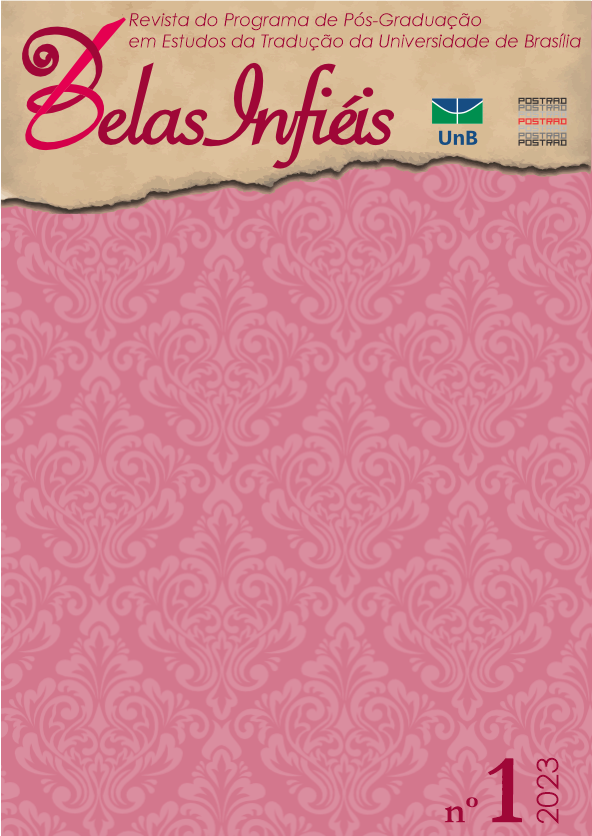“Mãos à obra e aprendei o que é próprio a cada cultura”: Uma nova tradução poética das Geórgicas II de Virgílio
DOI:
https://doi.org/10.26512/belasinfieis.v12.n1.2023.47015Palabras clave:
Virgílio. Geórgicas. Poesia latina. Tradução poética.Resumen
Virgílio é reconhecido por muitos ainda hoje como um dos maiores poetas de todos os tempos. Contudo, seu reconhecimento deve-se sobretudo à Eneida, bem como às Bucólicas, já que poucas são as pessoas que conhecem sua obra intitulada Geórgicas. Apesar disso, durante uma parte considerável da história da recepção de Virgílio, o valor das Geórgicas foi amplamente reconhecido, contando entre seus admiradores nomes importantes como os de Montaigne, Dryden e Leopardi. Proponho aqui uma breve introdução crítica para quem queira conhecer não apenas esse importante poema virgiliano, mas alguns aspectos fundamentais da cultura romana de modo geral. Encerro a exposição com uma proposta de tradução poética de Geórgicas II para o português contemporâneo, na qual exploro questões apontadas na introdução crítica.
Descargas
Citas
Catão. (2016). Da agricultura (M. Trevizam, tradução, apresentação e notas). Editora da Unicamp.
Dryden, J. (1709). The Works of Virgil. (Obra original publicada em 1697). https://en.wikisource.org/wiki/The_Works_of_Virgil_(Dryden)
Leopardi, G. (1898). Pensieri di varia filosofia e di bella letteratura. Volume I. A cura di Giosuè Carducci. Firenze: Successori Le Monnier.
Marrou, H. I. (1948). Histoire de l’éducation dans l’Antiquité. 2. Le monde romain. Paris : Éditions du Seuil, .
Montaigne, M. (1965). Essais. Livre Second. Édition présentée, établie et annotée par Pierre Michel. Paris: Gallimard.
Plato. (1903). Platonis Opera. Ed. John Burnet. Oxford University Press.
Pound, E. (1951). ABC of Reading. Faber and Faber.
Romero, N. (1948). Prefácio. In Virgílio, Geórgicas. Eneida (A. F. de Castilho, & M. O. Mendes, Trads.) (pp. V–XXVII). W. M. Jackson Inc.
Santos, A. R. P. (2020). Geórgicas bárbaras: Estudo para uma tradução hexamétrica do poema didático virgiliano [Tese de Doutorado, Universidade Federal do Rio de Janeiro]. Rio de Janeiro.
Silva, T. P. B. A. (2010). O II Canto das Geórgicas: O significado das digressões na poesia didática [Dissertação de Mestrado, Universidade Federal do Rio de Janeiro]. Rio de Janeiro.
Trevizam, M. (2014). Poesia didática: Virgílio, Ovídio e Lucrécio. Editora da Unicamp.
Varrão. (2012). Das coisas do campo (M. Trevizam, tradução, introdução e notas). Editora da Unicamp.
Vergil. (1900). Bucolics, Aeneid, and Georgics Of Vergil. J. B. Greenough. Boston: Ginn & Co.
Virgile. (1998). Géorgiques (Texte traduit par Eugène de Saint-Denis). Les Belles Lettres.
Virgílio. (2012). Bucólicas. Geórgicas. Eneida (A. da Silva, Trad.). Círculo de Leitores.
Virgílio. (1948). Geórgicas. Eneida (A. F. de Castilho, & M. O. Mendes, Trads.). W. M. Jackson Inc.
Virgílio. (2019). Geórgicas (P. S. Vasconcellos, Org.; O. Mendes, Trad.). Ateliê Editorial.
Virgílio. (2013). Geórgicas I (M. Trevizam, Org.; A. F. de Castilho, & M. Trevizam, Trads.). Editora UFMG.
Virgílio. (2019). Geórgicas III (M. Trevizam, Org.; A. F. de Castilho, & M. Trevizam, Trads.). Editora UFMG.
Descargas
Publicado
Cómo citar
Número
Sección
Licencia
Derechos de autor 2023 CC BY

Esta obra está bajo una licencia internacional Creative Commons Atribución 4.0.
Copyright Statement
Given the public access to this journal, the texts are free to use but requires the recognition of the original authorship and initial publication in this journal to be properly stated.
The journal allows the use of works published for non-commercial purposes, including the right to submit the work to publicly accessible databases. Published contributions are the sole and exclusive responsibility of the author(s).
- When submitting papers to be evaluated by the Belas Infiéis journal, the author(s):
- Declare that the contents of the contributions are original and of their original creation, being entirely responsible for their content if there is an objection by third parties.
- Claim to be aware that they should not commit academic plagiarism.
- Declare that the manuscript has not been published, completely or partially, in Portuguese or another language. If it is a translation it should be submitted to the Translated Articles section.
- Declare that the manuscript is not being evaluated by other journals.
- Declare that the manuscript was not submitted to another journal simultaneously.
- Commit(s) to inform the journal of any kind of error or inaccuracy in their contribution (published, in evaluation or in editing) and to collaborate with the editors to make due corrections of the article (when in evaluation or editing) or erratum/retraction (after publication).
- Declare that there is no conflict of interest regarding the published work.
- Authorize its release if it is accepted for publication without any kind of monetary compensation.
- Agree to assign non-exclusive rights to publication to the magazine, remaining free to make their contribution available in other media as long as the publication of the first version in Belas Infiéis magazine is mentioned. They also authorize Belas Infiéis to assign their texts for reproduction in content indexers, virtual libraries and similar platforms.
- Maintain copyright and grant the journal the right of first publication, the work being licensed under theCreative Commons Attribution License.
- Is/Are allowed and encouraged to publish and distribute their work online after the editorial process, which may increase the impact and citation of the published work.
- Authorize the editorial team to make textual adjustments and to adapt the article to the publication rules, when necessary.



















